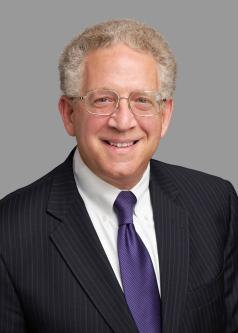Jonathan Baum, ’82: Champion of Pro Bono Reflects on His Public Service Commitment

Several years after graduating from the Law School, after stints as a federal judicial clerk, an associate at a major law firm, and a clinical fellow at the Law School’s Mandel Legal Aid Clinic, Jonathan Baum, ’82, contacted about twenty Chicago law firms with an offer: he would do billable work two-thirds of the time, for two-thirds of what would have been his pay, and he would commit the other third of his time to pro bono work.
“I grew up in a home where the Jewish social justice obligation of tikkun olam was strongly instilled in us, meaning we had a duty to repair the world,” Baum said. “For a lawyer, pro bono work offers the opportunity to fulfill that obligation.”
Only one firm, Sidley Austin, took him up on his offer. He worked contentedly there for five years until he came up for partnership in 1993 and the firm wanted a full-time commitment from him. “I wanted to do more pro bono work, not less,” he recalled.
Around the same time, he heard that Katten Muchin Rosenman was thinking about strengthening its pro bono program, and that one idea being considered was to create a full-time pro bono position. He put together a proposal for such a role and pitched it to the firm’s leadership. They created the position and hired him to fill it. “It was a very bold step for Katten,” he recalled. “Today there are about a hundred and fifty firms with a full-time, attorney-led pro bono operation, but back then there were no more than five.”
He’s been at it for more than thirty years now. Last year his office partnered with more than seventy organizations to identify and pursue pro bono opportunities for Katten’s approximately 750 attorneys in ten US and overseas offices. Baum also personally represents pro bono litigation clients, including asylum seekers and people experiencing racial discrimination in housing or public accommodations. For many years he has represented the Giffords Law Center to Prevent Gun Violence in its defense of state and local gun regulations against constitutional challenges.
In 2022, he was honored by the Chicago Lawyers’ Committee for Civil Rights with its Champion of Justice award, adding to many other honors that he and his program have received. He is also past president of the Lawyers’ Committee and past vice president of the ACLU of Illinois.
Baum is particularly proud of the Katten Legal Clinic, operated together with Legal Aid Chicago at the Jose de Diego Community Academy in Humboldt Park. Now in its eleventh year, the clinic—the first ever to be located within a Chicago public school—has assisted more than 1,200 people, all low-income and mostly persons of color, with a broad range of civil issues. “It’s great for the clients, and the attorneys love it: there has never been a lawyer who served at the clinic who didn’t come back to do it again,” he said. Among other recognitions, the clinic received the American Bar Association’s Pro Bono Publico Award for innovations in providing legal services for the poor and disadvantaged. Baum is pleased to note that, following the Katten model, several other Chicago law firms have established community-based clinics in cooperation with Legal Aid Chicago.
Before coming to the Law School, Baum worked in the congressional office of Abner Mikva, ’51. Mikva later served as a US Court of Appeals chief judge and as White House counsel, as well as taught at the Law School. “Ab Mikva was my hero, passionately committed to his liberal positions but always trying to find common ground with his ideological opposites. The thing I liked best about my time at the Law School was that it honored the same core value—that a free, respectful clash of ideas is the best way to find the best answers. I entered the Law School a liberal, and I left the Law School a liberal, but a more effective liberal because my views went through the crucible of meaningful debate with those to my right.”
He said that when he consulted with Mikva about persuading a law firm to create a full-time pro bono position in 1993, Mikva told him, “It’ll never fly.” A proud moment came some years later, when Mikva said—at a Katten pro bono event—“I’ve never been so happy to have been proven wrong.”
Baum says he is “grateful to his firm and to the legal services organizations my colleagues and I work with for the opportunities they have given me to fulfill my obligation to help repair the world.”
